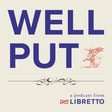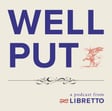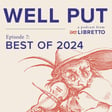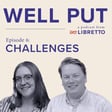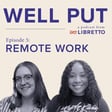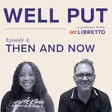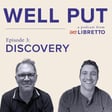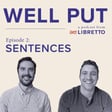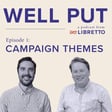Become a Creator today!Start creating today - Share your story with the world!
Start for free
00:00:00
00:00:01

Episode 10: Public Speaking
Speaking with the public -- from boards of trustees to student groups and everyone in-between -- is an integral part of what we do at Libretto. Join Neal Kane and Ian Sutherland as they discuss how they prepare for their public speaking engagements, what to do (and not do), and the best way to conclude a presentation.
Mentioned in this episode:
- GK Training
- Don't Say Um by Michael Chad Hoeppner
- The Atlantic
- Ear Hustle podcast
- "Pee-wee as Himself"
- The Leftovers
Hosted by Neal Kane and Ian Sutherland
Produced and Edited by Tiffany Carlson
Music by Coma-Media, via Pixabay
© 2025 Libretto. All Rights Reserved.
Recommended
Transcript
Introduction to Well Put Podcast
00:00:14
Speaker
Welcome to Well Put, a podcast about communications for mission-driven organizations from libretto. I'm Neil Cain. And I'm Ian Sutherland, a senior creative lead here at libretto.
Approach to Public Speaking
00:00:26
Speaker
So today we're going to talk about our approach to speaking and whether that's at a conference or to a student group, or a board or any other combination of folks where you have to, ah where we're sharing information about our work in some kind of a more or less public forum.
00:00:47
Speaker
Yeah, this is a really exciting topic for me. I really enjoy the challenge of public speaking in a huge ah part of any situation where we at Libretto are giving a presentation or leading some kind of workshop or any other kind of forum where we're speaking ah extemporaneously to a group.
00:01:10
Speaker
ah There's a good amount of preparation that goes into preparing the remarks, preparing those sessions. um And I wonder, Neil, if you could start us off with talking about how you approach the prep piece to a lot of your public speaking.
00:01:26
Speaker
Yeah, there are there are a lot of um elements to that. And I guess they all tie back together. to the theme of preparation.
00:01:37
Speaker
And by that, I mean an appropriate level of preparation. But I think there is always a baseline. So I'll use as an example, let's say you're you're on a panel at a conference.
00:01:52
Speaker
And in that scenario, For me, what would constitute preparation would be figuring out who's going to be engaged, ah figuring out an outline of comments, having some sense of who is going to say what, having a sense of timing, and having some kind of either walkthrough or conversation where you discuss how things are going to go and how the content is generally going to flow. And I guess what that does is it circles back to another ah sort of principle, or maybe it's a corollary, which is to never, ever wing it.
Preparation vs. Authenticity in Public Speaking
00:02:39
Speaker
And i think um I think people feel, i don't know if there's sort of a ah myth where it's, you know I'm gonna receive inspiration or I have good instincts or I want to read the room, but i I generally find that it never hurts to prepare. And I guess one could talk about whether over-preparation is possible.
00:03:03
Speaker
ah That's not something I've really run into. And what I tend to run into is people um doing less than they should. And I just, I mentioned the panel example.
00:03:16
Speaker
I'll just mention another what may seem a random example is ah the wedding toast. yeah yeah you know And I think we've all been to a lot of weddings and i think I think the toasting has become like so many aspects of weddings, like much more ritualized.
00:03:34
Speaker
And um I find that it's not enough to just be quote unquote authentic. and I feel like I think you want to do something that feels, I don't want to say i don't want to say deep and sincere, but ah it's about some kind of an idea.
00:03:54
Speaker
or or it's about i mean For example, if I was telling ah ah something about a ah how how to do a wedding toast, right I would say, well, I want to learn something about the person that I didn't know.
00:04:06
Speaker
And I'd like it to reflect well on them. ah Sarcasm does not do it for me. ah Sentimentalism doesn't do it for me, but sort of a simple story, let's say, that's illustrative of that person's character.
00:04:21
Speaker
So again, if I was preparing a wedding toast off the top of my head, that's what I might do. And then i would talk through it multiple times. I would repeat it. I would you know say it aloud driving around in my car.
00:04:33
Speaker
And I tried not to drink beforehand. And then to me, again, that's so that's there's two scenarios that constitute. ah in my mind, an appropriate level of preparation for speaking. And I don't know how that relates to your experience of these things, Ian, but I'd be curious to hear
Runway Metaphor and Personalization in Speaking
00:04:52
Speaker
that.
00:04:52
Speaker
Yeah, Neil, I wholeheartedly agree with never winging it. And I think the wedding toast is ah a great example because everybody's familiar with a wedding toast where somebody maybe hasn't done as much preparation and thinks, oh, well, I'll find it in the moment. And then 10 minutes later, everybody's looking at each other, cringing, going,
00:05:11
Speaker
When is he he or she going to land the plane? and So my take on that is while I agree with the concept of never winging it, whether it's a wedding toast or a presentation to a board of trustees, I do like the idea of leaving some room in to be able to respond in the moment, whether that's to a question or an audience reaction.
00:05:32
Speaker
And my visual for that, that I use for myself, is this runway idea. For me, the hardest part of any public speaking engagement, whether it's a wedding toast or what we do here at Libretto is the beginning and the end section.
00:05:49
Speaker
And for me, this runway idea is you want to have the preparation in place to get the plane off the ground, have enough pavement below and in front of you to lift off together.
00:06:02
Speaker
and then have enough ground below when you get to the end to smoothly finish whatever it is you're saying. So my response, Neil, yeah, I 100% agree.
00:06:12
Speaker
Never ever wing it. You should have some idea of what you're going to talk through, having some specific example. personalizing with a story or an anecdote I think is also very important, something I think you do really well.
00:06:26
Speaker
um And again, that relates both to whether it's wedding toast or a public speaking engagement um or a short introduction to a panel or or to ah a situation where it's a board of trustees.
00:06:38
Speaker
But yeah, I think of it almost like that runway model. You construct enough to get you off the ground, into the air, and then you have pavement below you for when you want to land the plane. Yeah, and I think, i mean, it's funny, as I'm thinking about this, you know, and I don't know if maybe it's not if I do too much of this kind of work or if or I'm just a somewhat critical person in nature.
00:06:59
Speaker
But like, when to go back to the wedding toast, when you hear someone say, i did nothing to prepare for this, or I started to write down my thoughts last night. my My first immediate response is that is patently clear and also and and not particularly enduring.
00:07:17
Speaker
and And I want to mention in terms of the starting point also, yeah think people wonder a lot about humor. And I think it's tricky because because humor can be so upset subjective and something that you know feels funny to you may feel like an inside joke, may feel offensive to somebody else, may not align with their sensibilities.
00:07:41
Speaker
I do think ah one one piece of spontaneity that, and this sort of alludes to something you were saying, Ian, is that if you're starting a talk, and you can allude to something like in the immediate past, you know, it's like, well, when so-and-so was talking about this idea of cultivating donors,
00:08:02
Speaker
I was thinking about how a lot of our work is about engaging potential donor in something that isn't necessarily directly about a solicitation. And what an interesting kind of combination and juxtaposition and contrast those two scenarios have.
00:08:19
Speaker
So immediately, again, you connect this to something else that's happened and you've done it in the context of an idea rather than, wow, wasn't that a great speech? That was super interesting.
00:08:30
Speaker
ah Again, just sort of truisms. i feel like if you can synthesize something, not something hugely complicated, but really show that you've really made an effort to connect some dots rather than to just sort of parrot back kind of tropes.
00:08:46
Speaker
ah i think that I think that lends a lot to um one's credibility. Yeah, and it's interesting too, because when I think about the idea of engaging your audience, like humor, I think it needs to be done with a lot of care and i' also, of course, dependent on the situation in which you're speaking.
00:09:10
Speaker
So I know for me, if we're doing a ah some kind of presentation at work or if it's, for example, a messaging workshop, which we do a lot at Libretto, we usually start off with some kind of icebreaker so that everybody in the room has a chance to introduce themselves and maybe give some personal background about their connection to the institution,
00:09:32
Speaker
and why they're in the role that they're in and where they want to see themselves you know in the future. And I think for me, it can be very effective if you know in the appropriate setting later on in that presentation, I can call somebody out from the icebreaker when we get to a point in the presentation that relates to what they said at the beginning.
00:09:55
Speaker
So on the one hand, it shows you're paying attention ah to your audience. And on the other, I think it tells the rest of the audience that wasn't called on, oh, I better pay attention. I think it just, it helps keep people in the,
00:10:10
Speaker
groove It keeps people engaged. ah But I don't know, Neil, if you feel similarly, if you would have a more subtle approach to that engagement mechanism or if there's other ways you would do it.
00:10:22
Speaker
No, I think that...
Audience Engagement Techniques
00:10:23
Speaker
um having a bi, what I would just call a bi-directional ah dimension to things, especially get out of the gate, is vastly preferable to what can begin to feel like a ah talking head.
00:10:38
Speaker
You know, it's like, I'm going to talk for 30 minutes, and then I'm going to take seven minutes of questions, and that's good that's like that's it. So, of course, now it's time to reveal one of our trade secrets in terms of an icebreaker technique that we've used multiple times, which is,
00:10:53
Speaker
And you were and I and it were in a meeting at a school with like 25 faculty members. And you know i've often said what you'll often hear me say it. yeah If you just say say to somebody, give me one word that describes xinti institution, and they would say community.
00:11:07
Speaker
And again, you know what we do is we go around and say, through this campaign, i would like our institution to become a little more blank. And then they come back with more inclusive, more ambitious, more visible, more affordable. And you're immediately getting nuanced inputs, getting factored into the mix, which ah instantly feels like something that can be turned into a point of differentiation.
00:11:38
Speaker
And also it is about a conversation. And in a sense, it's about a conversation with 25 people. And the oh course, you other the other rule is like, you can repeat what somebody else said. So you don't have to be original.
00:11:52
Speaker
We just want you to you know use a stream of consciousness approach to what's top of mind. And I find that whenever you do that in a set session as a speaker that sends a message that you know I am curious about you, the participant, I want you to actually participate And to your earlier point, I'm going to do something with what you say.
00:12:13
Speaker
Right. I also find it that mechanism um helps to make, as you say, it it makes it more bye bidirectional. And I also find it alleviates sort of the number one anxiety around public speaking, which is that people are afraid of public speaking. And I think when you frame it more as a conversation from the beginning, at least I find personally for me, um it helps with any nerves that that I have.
00:12:41
Speaker
do you Do you struggle at all with nerves, Neil, when it comes to a big presentation or a big, you know, maybe it's a larger crowd than usual? And if so, how do you sort of deal with that that anxiety?
Staying Alert and Practicing for Public Speaking
00:12:53
Speaker
Well, I think you always want to be, sounds so cheesy, you always want to be on your toes. And again, it's part of the whole thing. I'm never phoning it in. You never want to assume you know that I've got this.
00:13:08
Speaker
And if it's something you if it's a repetitive um or very derivative of stuff you've done before, it's probably going to come across that way. It does make me think of this for this this one time where I was on a plane and I had to do a presentation of a board. That was a pretty big deal.
00:13:24
Speaker
And i had my laptop open and I was on the plane and was kind of trying to. ruble Because the plane is loud, but I wasn't just gonna read it. I wanted to try to talk to it.
00:13:38
Speaker
And and but I'm trying to do it sort of sato voce. And the person sitting next to me goes, can't help but, and he he recognized the logo of the organization on the slide.
00:13:50
Speaker
and And then he said, you're going to be giving that presentation to me tomorrow. Know your audience. ah But you know what's funny?
00:14:02
Speaker
i mean talk And I'll tell you, I had never thought of this. Talk about a great way to start off the presentation. Yeah. i mean Yeah, because you're going to anecdote. Yeah. and he And he said something like, he's like,
00:14:16
Speaker
I think this is going to be great. And trust me, I know firsthand. I mean, it was, so again, I think, you know that's also, and it's funny, those things are, those things are humanizing, you know? And, yes and I, I do think people respond ah really well to that.
00:14:33
Speaker
And, you know, I was also just thinking of a time when you and I were doing ah um a messaging presentation, a message training at a college, um, and we were running through sort of the highlights of the messaging platform.
00:14:47
Speaker
And I went through and kind of summarized or paraphrased my points. And then i I totally remember this. You got up and did yours and with no notes,
00:15:01
Speaker
And really without referencing the slides, it was kind of letter perfect. And ah I was so impressed because again,
00:15:13
Speaker
ah it yeah was totally cohesive. and yet did not feel scripted. And actually, don't if I've ever asked you. i mean, do I'm sure, i i hope you remember that that session. and And I wonder, how much preparation did you do?
00:15:29
Speaker
i One, thank you, Neil. That's very generous. I remember that workshop well, and it was a great ah great workshop. I think I was referencing a student we had spoken to during our discovery process and sort of looping in his story with one of the key messages we wanted to cover with the ah university leadership.
00:15:48
Speaker
But I remember the presentation preparation. Well, because in in some ways it's well, not quite similar to your story of being on the plane, but in terms of practicing quietly, we had it was a um client. The client that that presentation was at was in a more sort of rural part of New Hampshire.
00:16:09
Speaker
And you and I were staying in this really wonderful old in the night before as our hotel before we had that early morning presentation. And I do remember as my preparation, and this is a preparation I do.
00:16:22
Speaker
95% of the time for particularly for messaging workshops, because I find it's a helpful way to, as you say, be on your toes and anticipate audience questions and audience reactions.
00:16:34
Speaker
What I did the night before in that in was took my phone, ah put the video on and just did a recording, three separate recordings of me going through my sections of the workshop.
00:16:50
Speaker
And each recording obviously was a bit different. i didn't you know I don't really script out what I'm going to say. I more of kind of block out important points I want to hit. And I do this moment. I remember ah probably 10 o'clock at night in this small inn in New Hampshire, very quietly making these recordings to prepare myself for for the next day.
00:17:11
Speaker
And I don't know, there's something, I don't know if you do this for yourself, but there's something about looking at yourself on a video screen, both while you're practicing and then watching it back after you've made the recording.
Using Video for Practice and Self-Critique
00:17:26
Speaker
That just helps me self critique before a presentation, like if I'm moving my hands too much, when I am actually doing the presentation the following day, i can be a little bit more aware of that and a little bit more strategic about words I might use or a phrase, you know, that perhaps I watch back and I cringe and go, no, that's not a good phrase to use for that particular um you know, for that particular topic. But that's, that was part of my, yeah for that particular yeah workshop.
00:17:55
Speaker
<unk> It's interesting because, and and here is where I'll make a pledge. So there's, there's a guy ah named ah Michael Chad Heppner and his firm is gktraining.com. And we'll put a reference, a shout out in the,
00:18:09
Speaker
show notes but he's someone i've actually known for a really long time even before he started doing this work and is and yeah he was um andrew yang's communications director and he's a masterful public speaking trainer and he actually did a session with libretto at one point and and the videotaping was part of that and it it is funny because Yeah, I think there's something that's on a certain psychological psychological level sort appalling, right? Because it's like, oh, I don't like to look at myself.
00:18:40
Speaker
Yeah, it's so hard. I'm going to see myself messing up. I'm going to see all my you know ums and likes and you knows, which is something that, trust me, Chad talks about at some length and actually has has written a book about it.
00:18:56
Speaker
um But, and and i I, it's funny, I remember from that session, i think it was after the lunch break, and he said, okay, Neil, I want you get up and I want you to pitch Williams College, I think he said.
00:19:08
Speaker
So today we're here because we want to take a little time to sort of give you an and introduction an introduction of the types of things we do, and then ah share some ah a few a few ideas about our process and yada, yada, yada.
00:19:27
Speaker
And then when he stopped me, he said, you are qualifying everything, kind of, sort of, yeah a little bit, a few, some. And he looked at me and it was like, it was very like, it was very, I'm so many almost sort of corporate, you know, but he's, i mean, he's, and he's a wonderful, wonderful instructor. And he's he just looked at me, he said, lead, like lead to the conversation.
00:19:52
Speaker
And love you know it's it's a it's a great you know mindset because especially I think I, you know personally, I think I'm kind of a weird combination of ego and empathy. So you know I definitely have a point of view. i definitely have opinions and I'm loathe to seem to too strong-willed or to ah too opinionated.
00:20:18
Speaker
And i'm yeah it's interesting, which I think also, that kind of feeds into notions of, you know, likability. And yeah, again, for me, these conversations, uh, or these, these, these public events are about, and that's a, it's a interesting, it's that combination is always interesting.
00:20:39
Speaker
And there's a real tight wire, ah quality to it. um where and you know I think of an instance where we were talking to a board, presenting to a board, and I presented one of the ideas in this platform, and somebody in the board said, basically, I think that's an incredibly dumb idea. Where did that idea come from?
00:20:57
Speaker
The idea had come from the president of the university who was sitting next to this board member. yeah And immediately I said, You know, again, i'm always talking about how i value candor. It's kind of, again, talking about tropes, but I said, you know this is why we present things at this stage because if people have certain reactions to things, we can see if that's the case with other folks and we can fine tune the language.
00:21:22
Speaker
So it's actually, and and it's not easy to be, you know, frank, but it's really helpful to us in the long run, yada, yada, yada. So again, I think, ah you know, those are but precarious situations.
00:21:35
Speaker
But i think I think the more prepared you are, the more composed you are, that also helps you deal with things that might kind of pop up out of nowhere.
00:21:46
Speaker
And I love that coaching lead because, and I don't think it's too ego or strong too big of an ego or too strong-willed to have that mindset. And I think it actually helps with some of those nerves we were talking about earlier.
00:22:00
Speaker
When you're up in front of a room, you're flying the plane. And no matter what comes out of the audience, you should be more than comfortable to, like in this situation with the board, to easily diffuse what could potentially be a otherwise derailing comment and to just guide everybody back to the topic at hand and eventually the conclusion of what you're speaking to. And I really, I just really liked that approach.
00:22:37
Speaker
about the prep piece of a public speaking engagement. We've talked about the tips to employ while you're up speaking. Let's talk a little bit about how you conclude remarks or a ah public speaking engagement.
00:22:50
Speaker
I like to usually and with a series of key takeaways of topics that were covered, maybe open up to a a brief q and a from the audience.
00:23:02
Speaker
How do you typically like to off-ramp uh yeah and well but but before yeah well before we get into that i would actually like to just talk for a second about would just realize there's something i i had forgotten to bring up which is wait for it slides what about the slides i think it's helpful to spend a few minutes there and you know i so i had the whole thing of never wing it never ever read the slides is also a one-on-one always speak to the slides and would say always speak to the slides because otherwise why are they there?
Effective Use of Slides in Presentations
00:23:36
Speaker
But a slide with less on it that you can kind of riff on a little bit within reason really good thing. And I remember this, I was doing this one presentation, I think it was in front of like 250 people in like a ballroom. And they had a scenario, and I'm not sure how common this is now, but basically at your feet, there was a monitor with your slides on it.
00:24:01
Speaker
And it was the greatest thing ever because you could refer to them and you could riff off them. You didn't have to look over your shoulder. You didn't have to look to the side.
00:24:12
Speaker
ah you didn't have to stand to the side and look over and then' look look back. So, you know, again, i i just, I don't want to state at the obvious, but but like having having slides doth not preparation make, right? Just having the slides is not the preparation.
00:24:28
Speaker
And the other thing is, you know Again, if you have 30 minutes and you have 15 slides, it's it's it's arithmetic.
00:24:41
Speaker
You have two minutes a slide. If you are on slide three at minute 10, you are behind. And that, again, in terms of the practicing and the pacing of things,
00:24:54
Speaker
Including when there's more than one of you presenting, in some ways especially, because again, you you want to think of the pie and how you're divvying up the pie. And and it's that that stuff is not a mystery. There are things that happen that do happen unexpectedly or so or yeah serendipitously.
00:25:11
Speaker
But that's part of preparation is like, you know this is the content that's going to mark the arc of what I'm doing. And let me figure out how, how that is going to relate to the content of the remarks that I'm making.
00:25:26
Speaker
I always love a musical metaphor. And I was just thinking while you were discussing that one-on-one piece, which is do not read the slides verbatim. And I think it's always worth reemphasizing.
00:25:37
Speaker
To me, it's like if you're playing the piano or the guitar and you have a musical scale, nobody wants to hear a solo, just all of those notes of the scale. You want to improvise within that scale to make something musically interesting. And it is torturous to be at a presentation to see slides or notes projected and just to hear somebody read off of them.
00:26:00
Speaker
That information will not be retained in any meaningful way. Yeah. and And before we get to the conclusion, going to, of course, insert one other slightly weird example, which is I have delivered and read written actually ah ah number of eulogies.
00:26:17
Speaker
And I would say, given the nature of a situation, that kind of a situation, ah scripted eulogy is, I feel like, is utterly appropriate if that's the route a person wants to go. Because improvisation, I mean, you know, it's almost like the the inverse of the wedding, right? Improvisation in that environment can be so fraught and and holding it together can be so fraught that it's like, that's an instance where it's like, I found that like you walk in there knowing what you're going to say and you say it And actually, in some ways, you almost say it dispassionately.
00:26:49
Speaker
That, to me, is what constitutes efficacy in that instance. So anyway, I didn't mean to to digress, but I think in terms of the um the the conclusion part, this is going to sound weird. Like, what's the best way to conclude a presentation?
00:27:05
Speaker
a few minutes early. Yeah, yeah, yeah. Agreed. ah which Which, again, you know, i think we've, and again, we've probably said this before, you know, No one ever said there were too few slides. Now that's a kind of a simplistic summary of of that type of thing.
00:27:21
Speaker
But I know I think that, um you know, it's it's funny. And of course, um I guess if you're doing Q&A on a panel, you know, whoever's facilitating, there should be a few questions kind of seeded.
00:27:33
Speaker
And i think your point also maybe I think the recap is good. But the idea, yeah, the idea of, you know, icebreaker of getting questions at the end where the audience is gauged.
00:27:45
Speaker
I think that's, a I mean, I don't know you have other if you have other thoughts or techniques that you think about in terms of concluding. I do. Well, a recent example comes to mind. a few of us from Libretto were at the American Fundraisers Conference in New York City for National Fundraising Day. And one of the keynote speakers ended with just a really great quote, which is from the West Wing, which in a room full of nonprofit folks really resonates.
00:28:11
Speaker
I'm a sucker for a quote to close out a ah speaking engagement. I think it can be You want to be careful and nuanced you know in terms of how you do that. But I think for something like a keynote, a quote can be a really nice way to ah conclude that. Of course, if you're running something like a workshop, a Q&A makes a lot more sense as ah as an official endpoint.
00:28:31
Speaker
But i do I do always like a quote. And I know for us at Libretto, sometimes when we're giving a findings presentation or a messaging presentation, we'll actually end with a quote from somebody at that institution. And sometimes that's the most resonant part of the of of that particular presentation for the client.
00:28:49
Speaker
I think that's, yeah, I think yeah it's a really interesting question. Of course, and this is like totally meta because now i'm thinking it's like, we need an incredibly strong wrap up to this podcast.
Diverse Contexts of Public Speaking: Weddings and Funerals
00:29:00
Speaker
We set the bar too high. We're not going to be drinking our own Kool-Aid.
00:29:05
Speaker
Well, I think we've talked about some good tips and I think we've shared some excellent experiences that we've each had both in our professional roles here at Libretto. And I do love, Neil, that you bring up weddings and funerals, which are great examples of public speaking and both very different settings and situations for delivering remarks. So I think i think we've we've ran the gamut, so to speak.
00:29:32
Speaker
Sounds good.
Cultural and Political Insights from The Atlantic
00:29:43
Speaker
So I think now we're going to segue into our wildly popular a segment on what are you loving? For me, I have had a subscription to the Atlantic magazine for about 10 years. It's been a family tradition that my sister... not know that. That's interesting. Yeah. Yeah. My sister, at every Christmas renews the print and digital subscription for the year.
00:30:10
Speaker
and i I started reading it in college, primarily for its political coverage. And I just, I i love the writing.
00:30:24
Speaker
ah it's It's the perfect length. for a story. It's a longer form than New York Times, Wall Street Journal, for example, it's a longer read.
00:30:35
Speaker
So I find when I'm having lunch, it's a great accompaniment to the meal and it usually takes two days to get through ah particular story. And while I was initially attracted to it for its political coverage because I was in a political communications program in college,
00:30:52
Speaker
These days, I find a lot of the cultural reporting to be excellent. There's a lot of reporting and takes that i strongly disagree with, which is also kind of why I like having a subscription to the magazine, because even though I may disagree with a particular angle from ah one of the reporters, I find that they're pretty good at framing the argument. And it's helpful for me to just have a deeper understanding for where folks may be coming from on on any particular issue.
00:31:21
Speaker
But I'd highly recommend their latest cover story. The the June cover story was on ah death row in America, and just a really incisive, personalized reporting on um five to 10 Americans. This reporter actually was a witness to executions in Alabama and Texas. Oh, wow. I think I might've heard something about that. Yeah. Yeah. Strongly recommend it, Neil. um I know you listen to um Ear Hustle. Ear Hustle? Is that the podcast? Ear Hustle, yep.
00:31:54
Speaker
Yeah. And this... I wouldn't be surprised if the reporter, Elizabeth Brunig, I think wrote it. I might be mispronouncing her last name. know I used to follow her when I was on Twitter. I followed her on Twitter a lot. And she is she was a fan she had a fantastic presence on social media. Do you know that she's like an obsessive baker?
00:32:15
Speaker
No, I didn't know that. no Yeah, she's a really, really interesting sort of character as well as like amazing character. ah writer. Yeah. And, and, and it's funny because I actually listened to, there was an episode of ear hustle ah recently, um which again, we might be able to put in the notes and they had an episode about ah men who had been taken off death row and women on death row.
00:32:40
Speaker
And ah yeah, really, really, really fast. That stuff. it's just, it's so profound in terms of you know, what it says about our ourselves as a society and our sense of, you know, ah compassion and, ah you know, retribution and- and Yeah.
Recommended Media: Pee Wee Herman & The Leftovers
00:33:03
Speaker
Actually, it's interesting. Justice, right? And forgiveness. Justice and forgiveness. Yeah. Yeah. Yeah. and And again, I just feel like when you hear about those things from incarcerated people, it's truly revelatory.
00:33:15
Speaker
it's truly revelatory i I strongly recommend her article if you get a chance to read it But back to you, Neil, what have you what have you been loving lately? Yeah, so a couple of things. Lately, um I've been watching, i've i haven't, I'm not through the whole thing, but I i watched the first installment of the Pee Wee Herman oh yeah documentary. And um I should know the name of that. So we can, we' we'll call it out of the notes, but.
00:33:45
Speaker
um And, you know, it's it's the type of thing that I love things where they take public, and of course, everyone knows I'm, you know, obsessed with celebrity, but it's in this instance, it's more...
00:33:56
Speaker
um how, how, of all, how he became a public figure and how much of that was about his will and his drive and what that did to his personal life, which included both his relationships and being out of the closet and then sort of going back into the closet, right? All our Rosie O'Donnell and then coming back out and what that,
00:34:17
Speaker
cost him. And of course, these types of you know things, they have a Tears of the Clown quality, but it's never that simple. like He's not super cooperative, And then you learn, this is not a spoiler, that he was dying during the making of this documentary, beknownst basically to no one.
00:34:35
Speaker
And the fact that it was you know unbeknownst to anyone says something about him too. so it's And there's also fantastic, fantastic archival footage. and And of course, he you know he represents this sort of confection, this idealized...
00:34:54
Speaker
you know, universe and ah learning about what went into the reality of making that is amazing. And I will just say, I've also just finished finished watching um The Leftovers, which is I think over 10 years old.
00:35:08
Speaker
And, you know, it's about, it's based on a Tom Parada novel where 2% of the world population just disappears one day. And it's about essentially the aftermath of that. And I just, ah but part of it is, it's interesting in in sort of a ah ah kind of ah you know elite TV show of 10 years ago. It's like pretty much all the episodes are an hour long, which is I think generally things are much or shorter these days.
00:35:33
Speaker
And ah I mean, this is the show that sort of made Carrie Coon's career. She is phenomenal, phenomenal in this show. And ah the fact that you're dealing with these notions of you know ideas of the, app i mean, again, we're talking the ideas of the afterlife and ah fate and ah how that affects morality and and also just incredible randomness.
00:35:59
Speaker
Mm-hmm. And there are there are parts of it, as you can imagine, there are parts of it that are extremely ah dark, but it's ah it's very daring.
00:36:12
Speaker
And you know i love I love things that ah mess with narrative conventions and in really smart ways. And this is definitely um one of those shows that I would and i would totally recommend it.
00:36:26
Speaker
Yeah, The Leftovers has been on my list for a long time. i I have yet to read the book or watch the show, but a lot of friends who are big fans. And then the Pee Wee Herman documentary, Pee Wee as himself is the name of that doc.
00:36:39
Speaker
That was actually written about in the Atlantic, which is why I'd heard some buzz about it. I by would like to check that out as well. Thank you for those recommendations. Absolutely. Yeah. And and i will i twenty I will tell you When I look at my and a subscription list, which I often do with a groan, as I think many of us do, and it's funny. um I think airmail is one of the the ones where it's like, if I was going to subscribe to something else, that would be a candidate.
00:37:05
Speaker
And the Atlantic. and the And the Atlantic also, I think just ah the way its reputation has ah kind of endured and really grown over the last 10 years no small No small editorial feat.
00:37:22
Speaker
No. And Jeffrey Goldberg, I think, is to thank for that. Yeah. and when you and know wait Because when you see the snippets and it's like, oh, I wish I was behind that paywall. So maybe um maybe that will be the next one. i'll um I say bite the bullet, but it's also like, again, what you know what are we doing? We're supporting...
00:37:41
Speaker
we're supporting independent journalism. So it's it's extremely, you know, a worthwhile thing to do. And the good news is, you know, obviously journalism is having a difficult time in the present moment for myriad of obvious reasons.
00:37:54
Speaker
The Atlantic is actually producing more print media issues per year and has a stronger subscribership than it did five years ago. So it's it's been heartening to see how the magazine has actually grown in the last decade.
00:38:09
Speaker
And I think one last thing I'll say on the Atlantic, like I have a subscription, of course, to the New York Times. i hopefully the new York Times isn't listening, it's student subscription. So it's like two bucks a month.
00:38:21
Speaker
um they They don't know I'm not a college student anymore. But I'd say I read the New York Times just to know what's going on. And then I read the Atlantic to understand what's going on. I think they do a really good job of getting under the layers of some complex stuff that's happening right now that's going to impact us far into the future.
00:38:40
Speaker
Absolutely. And that's one of the reasons, I guess, why they've been around for, you know, I don't know, who is it? ah I'm sure it's, i think it's over like over 150 years, I guess. Yeah. Huge longevity. Well, ah this has been Well Put, a Libretto podcast.
00:38:54
Speaker
I'm Neil Cain. And I'm Ian Sutherland.
Conclusion and Libretto Information
00:38:57
Speaker
If you want to learn more about libretto and what we do, check out libretto-inc.com. Well put.
